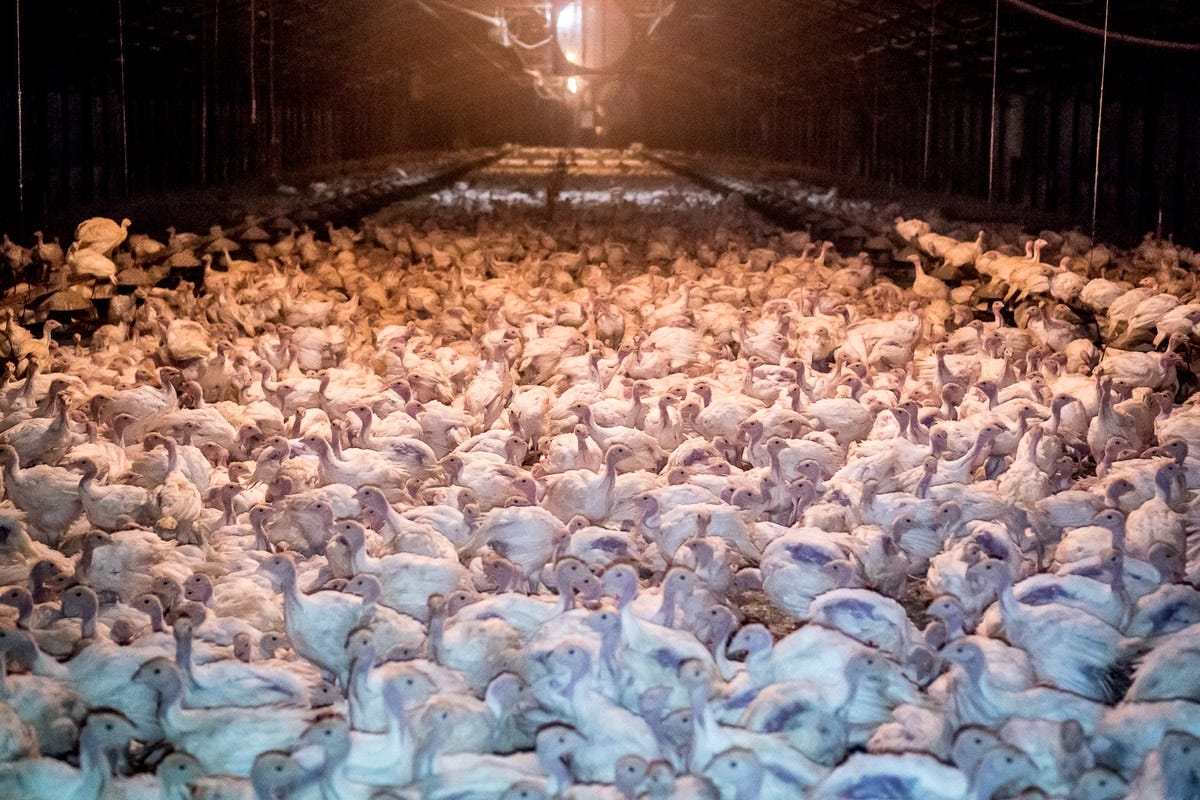Political whiplash
The dramatic contrast between animal rescue cases in Utah and North Carolina can show us the change we hope to see nationwide
NOTE: I’m writing every day in memory of Lisa, who died on October 13. Not all of these posts will be sent out by email, and some I may write from jail/prison, as I go to trial on November 29. So if you want to follow this journey, visit the blog every day. I’ll try to post by 10 am each day, but occasionally, I’m sure a post will be late.
—
Exactly four years ago, on November 20, 2017, DxE released an investigation of a large turkey farm in Moroni, Utah that included photos and video that the then CEO of the company described as “disturbing.” Within 7 months, however, instead of investigating the conditions on the farm, the local district attorney brought multiple felony charges against 5 activists, including me, for the removal of a half blind and injured turkey from the facility.
In two days, that story will change dramatically. The charges have been dismissed. The prosecutor, after discussing the case with DxE and our attorneys, now believes that “the criminalization of nonviolent investigation and rescue is unnecessary.” And the turkey farmer will be working with us, for the fourth year in a row, to rescue turkeys this Thanksgiving week.
And then, exactly one week later, I will go on trial in North Carolina, facing multiple felony charges for actions that were virtually identical to the actions we took in Moroni, Utah. In one county, even the farm owner agrees that we were “just saving lives.” In the other, I am a terrorist who will face years in prison.
Tomorrow, I’ll write more about my final musings about possible incarceration. But today, I want to say a bit about the political whiplash this week represents.
The reason for the difference in these two cases has much to do with individual personalities. Rick Pitman, the owner of the company in Utah, is a thoughtful, open-minded man. He is able to have dialogue even with people who believe his company is engaging in unspeakable acts of violence. And it is the common ground we found, after a chance encounter outside of his slaughterhouse, that led us to the arrangement we’re in today.
Curtis Burnside, in contrast, the owner of the goat meat ranch in North Carolina, has written bitterly about his experience with animal rights activists. He has made wild personal attacks against vegans and animal advocates, and seems completely unwilling to engage in dialogue with not just DxE, but anyone he sees as an animal rights supporter. That has left little opportunity for mutual understanding — and helped motivate the felony trial that will unfold in one week.
While the two situations have led to different outcomes, however, each represents an important opportunity. Rick’s case shows us that even animal advocates and farmers can work together, especially around the holiday season, to make the world a kinder place. This is symbolically important in a time of great conflict. But it also could lead to greater collaborations in the future. My dream is that Rick will someday throw away the blade, and transform his operation into one that makes healthy, sustainable meats that require no harm to any animals, i.e., plant based meats. The jobs this would create in Sanpete would be higher paying, and healthier. The pollution into the local environment would be reduced. And, most importantly, the animals that Rick himself says he loves (and which I believe him on) would be protected from harm. The path of dialogue allows us to achieve that.
Curtis’s case, in contrast, will show us the power of confrontation. While dialogue and compromise can help us build institutions for the future, only confrontation can create the dramatic narratives needed to motivate people to fight for those institutions in the present. I do not relish prison. But the last week of preliminary hearings in Sonoma County has taught me once again that there is something about the courtroom clash that generates energy behind the issue. Almira Tanner, our current lead organizer, commented after the hearings that it was surprising how little effort we needed to make to encourage people to come to court. Because courtroom drama intrinsically draws interest and attention. This is because the courtroom is where our most important debates, in this nation’s history, have been fought. The elevation of animal rights in the courtroom may allow us to elevate animal rights to that level of significance. And as I have argued previously, if we win, everything changes.
This is precisely why we need as many people sharing this narrative over the next few days. We’re living in a moment of courtroom drama. Rittenhouse. Holmes. Arbery. And so many more. The tension our society is facing is being resolved in these legal battles. If we play our cards correctly, this resolution will come with unprecedented progress for animals.


